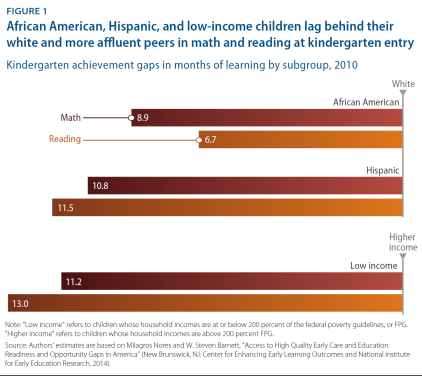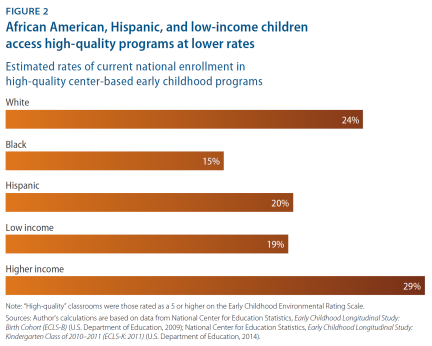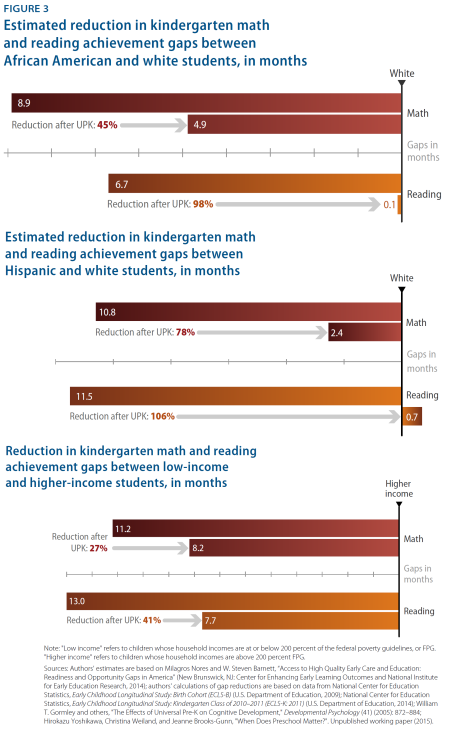National Institute for Early Education Research: How Much Can High-Quality Universal Pre-K Reduce Achievement Gaps?
In a report published by the Center for American Progress, NIEER researchers find that providing high-quality prekindergarten to all children nationally would dramatically reduce inequality in academic preparedness at kindergarten entry. Here we provide highlights from that report.
Many ethnic/racial minority children and children from low-income families enter kindergarten without all the skills they need to succeed in school. Compared to their white and higher-income peers, these children begin kindergarten months behind in reading (its precursors) and math. (See Figure 1.) The larger problem is that these measures of children’s academic abilities at kindergarten entry are strong predictors of later school success—these “achievement” gaps begin early and are only modestly closed after kindergarten entry. They remain large as children progress through school, and are difficult to close.

Early childhood education (ECE) programs show promise in reducing achievement gaps, particularly at kindergarten entry. Research suggests that attending high-quality ECE can enhance children’s development, reduce achievement gaps, and have longer-term benefits for children’s development. This research includes meta-analyses of ECE programs; evaluations of landmark ECE programs including the High/Scope Perry Preschool Project, the Abecedarian Project, and the Chicago Child-Parent Centers; and evaluations of larger scale publicly funded programs including Head Start (a federal program for at-risk children) and universally available preschool programs in Boston, New Jersey’s Abbott school districts, and Oklahoma.
Despite the known benefits of high-quality ECE, access to such programs remains remarkably low and highly unequal. Although rates of preschool attendance have increased in the last several decades, access varies widely by children’s backgrounds, with African American, Hispanic, and low-income children having lower rates of attendance. We estimated that rates of enrollment in high-quality ECE ranged from under 15 percent of black children to almost 30 percent of non-low-income children. (See Figure 2). And, importantly, the quality of the vast majority of ECE programs is low, particularly for low-income children and children of color. Yet research suggests that high-quality ECE produces the largest positive effects on children’s development. Further benefits may result when children have access to high quality ECE for a full-day, five days per week. Yet access to full-day, high-quality ECE is even more limited.

Despite a general consensus that high-quality ECE can improve children’s learning and reduce kindergarten entry gaps, policy makers and researchers have disagreed about the relative advantages and disadvantages of targeted and universal ECE programs. On one hand, a means-tested targeted program would (in theory) benefit only those children who are at-risk to begin kindergarten without the necessary school readiness skills, thereby narrowing the gap. On the other hand, a universal program would benefit all children and would improve the school readiness of all children, without actually narrowing the gap. However, there is evidence that universal programs do not affect all children similarly, but have larger effects on ethnic/racial minority children and children from low-income families, compared to white and more affluent children. Therefore, a universal program that increased enrollment of children from low-income and ethnic/racial minority families could have powerful effects in reducing the kindergarten entry achievement gaps.
As we describe below, we simulated the effects of nationally scaled universal publicly funded high-quality prekindergarten (UPK) on math and reading achievement gaps at kindergarten entry. Our results suggest that the achievement gaps could be reduced between 27% and 106%, or between 3 and 12 months of learning. We found that a high-quality UPK program could completely close the Black-White and Hispanic-White kindergarten entry gaps in reading. Other gaps prove to be more difficult to close completely. The Black-White gap in math could be reduced by 45% and the Hispanic-White gap in math by 78%. The income-related achievement gaps may be the most challenging to erase. Our results suggest that a high-quality UPK program could reduce the income-related achievement gap in reading by 41% and math by 27%. (See Figure 3.)

In order to estimate the extent to which high-quality UPK could reduce achievement gaps at kindergarten entry if every child attended a high quality program we used multiple sources of data. (See the CAP report for more information on our methods.) For measures of the impact we relied on the results from evaluations of Oklahoma’s Four-Year-Old Program in Tulsa and Boston Public Schools’ Public Prekindergarten Programs. We used the results of these two evaluations in our simulation for several reasons.
- Both programs are considered high quality and universal.
- The evaluations used rigorous methods.
- Impacts were estimated for subgroups by income and ethnicity.
- They span broad differences in populations and contexts across the country.
In conclusion, although challenging, implementing a high-quality UPK program has the potential to substantially reduce racial/ethnic and income based achievement gaps at kindergarten entry. A national policy to provide high-quality UPK could dramatically reduce ethnic/racial disparities in academic readiness at kindergarten entry. These gaps might even become negligible in both reading and math. Reductions in the gaps between children in low-income families and their more economically advantaged peers would be somewhat smaller but still meaningful. In implementing a national UPK program, it will be important to ensure that all children have access to truly high quality programs.
This blog post has been shared by permission from the author.
Readers wishing to comment on the content are encouraged to do so via the link to the original post.
Find the original post here:
The views expressed by the blogger are not necessarily those of NEPC.
